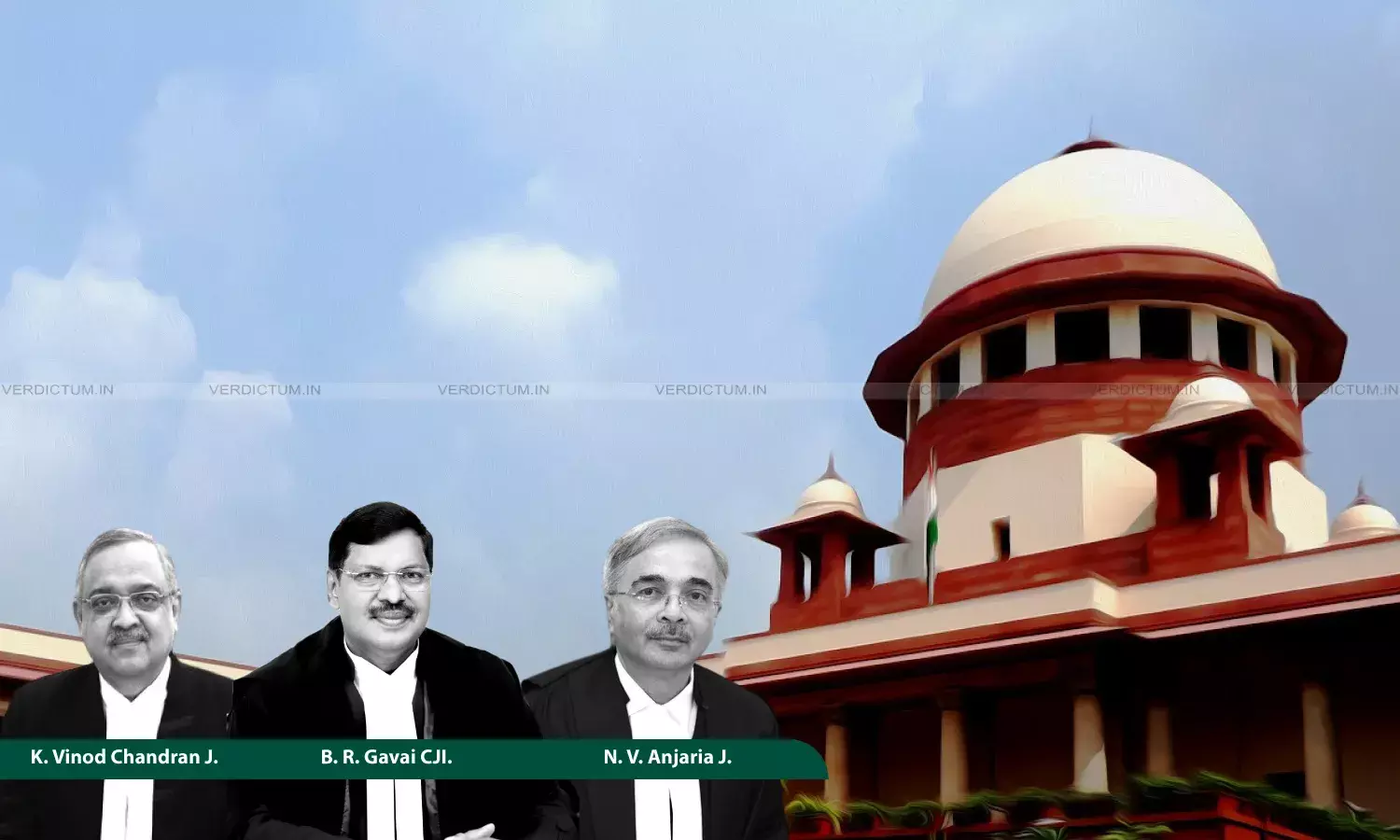Supreme Court Rules Out Complete Ban On Mining Across Aravali Range; Directs MoEF&CC To Prepare Management Plan For Sustainable Mining
The Apex Court held that mining across the Aravali range cannot be prohibited in its entirety and directed the Ministry of Environment, Forest and Climate Change to prepare a Management Plan for Sustainable Mining for the entire geological stretch from Gujarat to Delhi.

Chief Justice Of India B. R. Gavai, Justice K. Vinod Chandran & Justice N. V. Anjaria, Supreme Court
The Supreme Court has held that a complete ban on mining across the Aravali range cannot be imposed and directed the preparation of a Management Plan for Sustainable Mining to determine ecologically sensitive regions, restoration priorities and zones where regulated activity may be permissible.
The Court was hearing proceedings concerning the definition and conservation of the Aravali Hills and Ranges and the regulatory framework governing mining activities within the region. The Bench examined the recommendations of an expert committee constituted pursuant to earlier directions.
A Bench of CJI B.R. Gavai, Justice K. Vinod Chandran and Justice N.V. Anjaria, while stating that a complete ban on mining could lead to the creation of land/mining mafias and criminalisation, directed the “MoEF&CC to prepare a MPSM through ICFRE for the entire Aravalis, i.e., understood as the continuous geological ridge extending from Gujarat to Delhi on the lines of the MPSM for Saranda”.
Senior Advocate K. Parameshwar and Aishwarya Bhati, Additional Solicitor General of India, appeared in the matter.
Background
The proceedings arose from directions issued in earlier matters relating to mining in the Aravali region. The Apex Court had required the formulation of a uniform definition for the Aravali Hills and Ranges. It had also mandated an examination of illegal mining, ecological degradation and the management of forested and non-forested areas within the region.
A committee was subsequently constituted with representatives from the MoEF&CC, Forest Survey of India, Geological Survey of India, and the relevant state authorities. The committee submitted a report proposing definitions of the Aravali Hills and Aravali Range, identification of core and inviolate zones, and recommendations on mining regulation.
The Court considered the report, previous assessments and the legal framework governing the region while determining the appropriate regulatory approach.
Court’s Observation
The Supreme Court observed that the Aravali range forms a continuous geological ridge and extends across multiple States. It examined the committee’s recommendation, classifying the Aravali Hills, Aravali Range, core zones, inviolate areas and permissible zones for regulated mining.
The Court noted that the Aravalis contain ecologically sensitive areas such as wildlife corridors, protected regions, wetlands and aquifer recharge zones. It held that mining in these regions cannot be permitted without a scientific impact assessment and a comprehensive management plan specifying permissible and prohibited zones.
The Bench considered earlier studies prepared for other regions and found the approach used in the Saranda Management Plan suitable for application to the Aravalis. Accordingly, it directed that a similar geo-referenced and ecologically based plan be prepared. The Court emphasised the necessity of an expert evaluation of biodiversity, forest cover, hydrology and cumulative environmental impacts.
The Court held that the committee’s recommendations for prohibiting mining in protected areas, eco-sensitive zones, tiger corridors, wetlands and other restricted locations must be followed. It accepted the recommendation that existing leases could continue, subject to compliance with environmental safeguards.
The Court further observed that the regulatory framework for mining must ensure compliance with the Forest (Conservation) Act, the Environment (Protection) Act and the directions issued in previous orders concerning the Aravali region.
The Bench held that until the Management Plan for Sustainable Mining is completed, no fresh mining leases shall be granted, and all continuing activities shall be closely monitored for compliance with the committee’s recommendations.
Conclusion
The Supreme Court declined to impose a complete ban on mining across the Aravali range and directed the MoEF&CC to prepare a Management Plan for Sustainable Mining through ICFRE for the entire ridge.
The Court also accepted the committee’s recommendations regarding definition, classification and regulatory safeguards and directed that no new mining leases shall be issued until the Management Plan is finalised. Existing operations shall continue subject to compliance with the prescribed conditions.
Cause Title: T.N. Godavarman Thirumulpad v. Union of India & Others (Neutral Citation: 2025 INSC 1338)
Appearances
Amicus Curiae: Senior Advocates Harish N. Salve, A.D.N. Rao, Aprajita Singh, K. Parameshwar, with Advocates Mukunda, Kanti, Raji Gururaj, Shreenivas Patil and Others.
Counsel For Parties: Aishwarya Bhati A.S.G., Senior Advocate Ruchi Kohli, Advocates Mukesh Kumar Maroria, AOR, Jagdish Chandra Solanki, Suhasini Sen, Gaurang Bhushan and Others.


